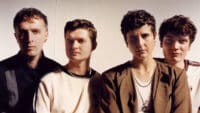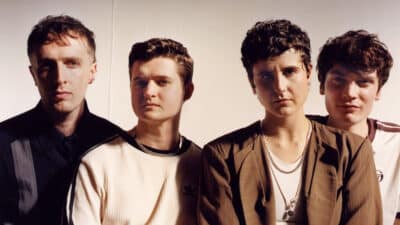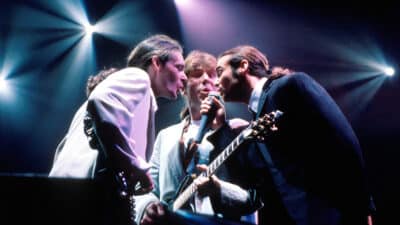Interview
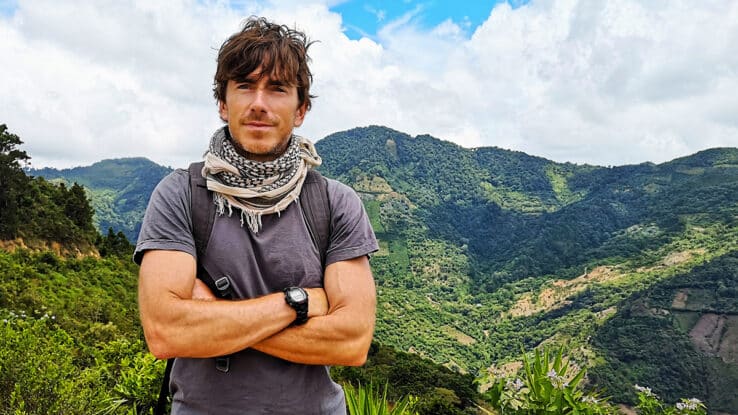
Interview
Simon Reeve: “Wilderness is a mindset as much as a physical place”
The broadcaster and adventurer on escaping our phones and finding the joy the world still has to offer
You would be hard-pressed to find a nicer person on television than Simon Reeve. Over the last two decades, the 51-year-old has explored the far reaches of the Earth, from the Stans to South America, with a rosy-cheeked grin and marvelling, earnest bursts of flippin’ eck!
Inspired by the compassion of his grandmother at home and the respect and relatability of Michael Palin on the screen, Reeve’s likability has given his travel documentary work a winning human touch. “I’m quite pessimistic person” he tells us as he returns from his sell-out tour To The Ends Of The Earth to his home in Devon. “But if you start from a warm positive outlook in your interactions with almost everyone on this planet, you’ll almost always get a warm positive response.”
Importantly, there’s grit and substance behind the smile. Starting off as a post boy at The Sunday Times after troubled teenage years, Reeve rose through the ranks as he pursued dark forces: “organised crime, biological warfare, nuclear smuggling… those are all sort of subjects that I started investigating quite early on”. After 9/11 he found himself in the spotlight as one of the world’s few experts on Al Qaeda, having published his first book on the subject in 1998. In successive years, his travel shows have shared a diligence in reporting, exposing not just a region’s natural beauty but socio-political turmoil and humanitarian issues.
2023’s hit To The Ends Of The Earth UK tour resumes in April, and during some well-earnt rest in between, Reeve opens up on some of the ideas that have shaped the show and his career.
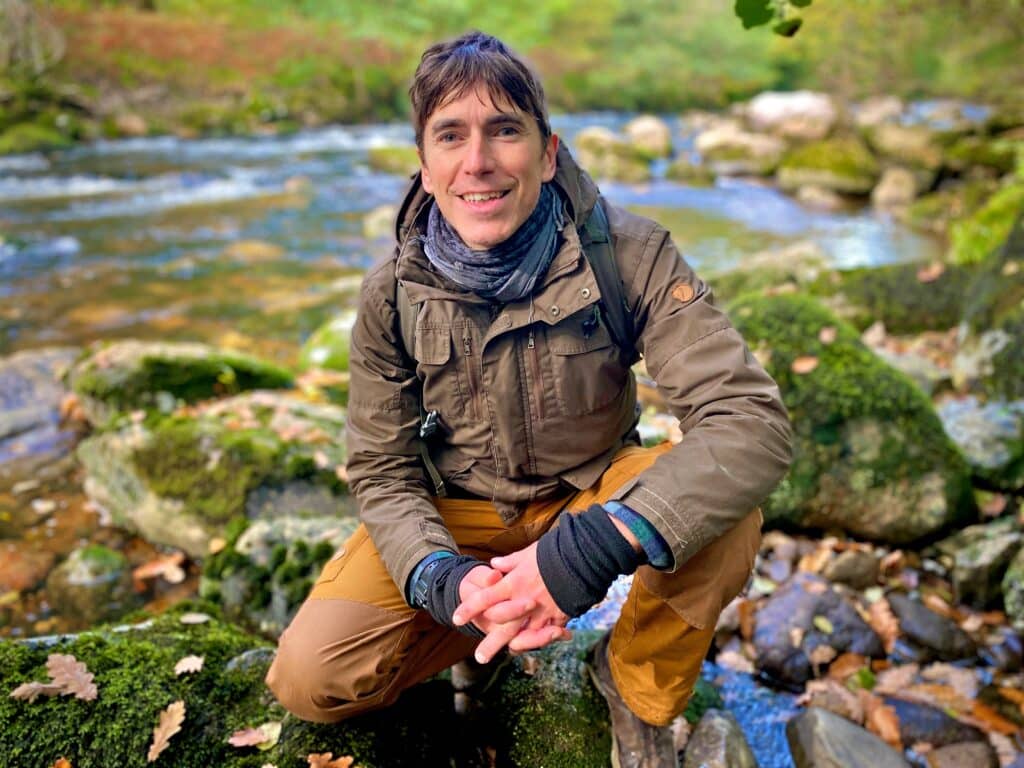
Simon, it’s been 20 years since you made your first step into television, and of course the world has seen some profound changes during that time. Is it fair to say it’s the changes you’ve witnessed through your reporting that inform the To The Ends Of The Earth tour?
I think that’s a good way of putting it. We are a little bit like a boiling frog: we’re being put into water that’s slowly heating up and we don’t recognise entirely what’s happening around us. Sometimes you do need to stop, take a think, look around and recognise that in your lifetime, certainly in my lifetime, the population of the planet has just about doubled. There are consequences for that. I mean I love us, I genuinely do, but oh my god we are a transforming creature.
The world has changed dramatically. Technology has shifted things. I mean, not just over those last 20 years – even just in the last three or four years I think we’ve all seen just how significantly more addictive screens in all their forms have become, but particularly those little bloody screens that kids are glued to.
That is something I’ve noticed in my own home, amongst family and friends as well, and of course everywhere you go you can’t miss it. We’re all focused on the little screens. We need a little bit of a nudge and a reminder that there is a big beautiful world out there, which has proper serious experiences, not these crappy virtual ones which are just absolute sh*te compared to a thimbleful of the sensory overload you can get by getting into the rest of the big wide world and experiencing it.
So the idea of the tour is to remind us that wild places still exist, fundamentally. We need to know about them, we need to understand them, we need to protect them and we need them in our lives as well. We need wild places and wild experiences. Obviously my journeys have been to pretty remote parts of the planet. I’m really keen on reminding people that those places are still out there, despite everything we’re doing to screw planet Earth. There’s still beauty and wonder out there.
I do try and explain in the show why wild places at the ends of the Earth really matter to people. But also, I totally recognise that not everyone can travel the planet. I want to nudge people in the audience and their families and remind them that even if they can’t or don’t want to go too far, they can have remote experiences near where they live. It’s a mindset as much as a physical place. So when you start thinking like that, when you start realising, okay, I can find experiences near me, that alters your perception slightly, I hope.
It makes people realise they don’t have to just turn right at the place they’ve always turned right: try turning left for god’s sake! Explore down there and feel what happens as a result; feel your senses engaging with the world around you in a totally different way. I feel like we’re losing some of our senses. We’re becoming a bit more like the humans in Wall-E, I don’t know if you remember that film slash vision of our future? We’ve got to rage against that and we really do have to keep nudging each other, badgering each other to get out into the big outdoors, because that is where happiness and experience lies.
Well, that so many dates of the first wave of the tour sold out should be reassuring in that regard. Have you noticed many young people in the crowds wanting to become new explorers?
I think the brilliant and beautiful thing about it, but the slightly tricky aspect as it were, is we’ve basically got the whole of Britain coming, which is amazing. Often with tours and things like this, you want to understand who your audience is, but I’ve had kids of seven and a lady of 96 in the audience on a single night, for goodness sake! So we’ve got the full range. At my age, most people are young by comparison now, but they’re coming and they’re interested, they’re keen on understanding the world. And they’re good souls who are obviously tempted by the screens, as we all are, but they’re keen to realise that there’s a planet out there that’s got some proper experiences on it for them to have.
They want that reminder, and I think we all need that bloody reminder. So I’m being that annoying friend in a way, who says, come on now, there’s a bigger, better life out there for you. In nature, on the planet, having experiences, doing fun things doesn’t have to be too far away. So, you know, there’s hopefully a bit of geography in the show, definitely. There’s my own ups and downs in life, the sort of extremes that act as reminder to people in the audience that even us telly types have had difficulty in their existence. And then there’s lots of nudging to remind people that there’s a beautiful planet out there that they need to be a part of, and they can sometimes find just around the corner.
You practiced this yourself during the lockdown years, where you visited The Lakes and Cornwall like many of us did when travel restrictions saw us all holidaying at home. But what advice would you give to people who want to continue to explore and try to find these patches of wilderness in the UK?
Well, I think first of all you need to recognise that going to look for a wilderness wilderness, you know, like an extreme wilderness, it’s going to be very hard to find. There is nowhere on the planet that is untouched by humans, but you definitely can find areas where human impact is minimal. And I think you can find that closer to home as well. You’ve really got to find the wilderness in your own head though. Put yourself into situations that feel a bit intimidating, almost a little bit out of your comfort zone. That’s when you start to realise who you really are and what you’re actually capable of.
So the the advice I would give is, if you want to, get a map of your own area, with your own home on it. Get a cup, turn it upside down on the centre on your house, draw a circle around the rim, and then explore everything in that area. And then from there, when you properly understand where you are, and where you exist, then you start to discover the roots beyond it. Roots in every sense, really.
But the way to start is, as with everything, to just bloody get on with it. You don’t need all the gear. You don’t need it to be the right time of day. You don’t need endless motivation. Just wander. Put one foot in front of the other and stuff will happen. And that is, I think, massively underrated – not just as a means of exploring but as a health tonic as well. You know, I talk a little bit in the show about how I personally feel the value of just the movement of walking, how it gifts momentum and experience. We overcomplicate things, and by making them complicated, we make them impossible or difficult for us to do. Or we make it viable for us to put them off until another date. But actually, if you want to do something, bloody do it. Get on with it, now.
Some people are lucky enough to be able to visit another country and develop a profound connection and understanding with its place, its people and culture, and it stays with them for a lifetime. But in your role you’re having these experiences once or twice a year; how do you balance the feeling of being deeply moved by your travels with your professional requirement to move on to the next job?
It’s not something I think I deserve any sympathy for, but a tricky aspect of the journeys is to be overwhelmed and moved by the experiences and then to come back and have more. Some people become quite hardened by travel, they become quite immune almost to the experiences. But I feel like I’ve gone the other way. I feel that I get more emotionally connected and more tangibly emotional about situations when I’m on the road now.
But I don’t think I would have it any other way. I wouldn’t want to be unaffected by the experiences. So I basically just let them wash over me and turn me into a bit of a gibbering, emotional wreck. I’ve cried at adverts, for god’s sake. I mean, seriously, I’m very moved by the situations I experience and the people I meet. I can get very emotional just thinking about it, and I get a sort of montage flashing up in front of my eyes. I would be bullsh*tting people if I denied that.
It’s pretty bizarre to go and do these things, and to have these experiences, for such a short period of time. They are deep experiences. Sometimes they’re in beautiful places. Sometimes they’re in really dangerous places. And you know, we’re often going in there without weaponry and body armour and we’re sharing a moment with people, so it would be awful if that wasn’t affecting us. But it’s human life; we should have our senses tweaked and teased. It’s important. It makes us feel alive. I can look back and think of these experiences that I’ve had year after year and know that life has gifted me great memories and profound encounters and I cannot begin to describe how eternally grateful I am for that. I recognise it as an utter privilege born of pure bloody good luck. This was never the life that I was supposed to lead, but I’m hugely grateful for it.
In the nature world, there’s the classic debate surrounding human interaction in filmmaking – not helping the struggling seal pup for instance. But in travel documentary, the issue is more in terms of people, and you’ve had to leave some horrific situations, such as the world’s biggest refugee camp in Myanmar. Are there any of these moments that have particularly stayed with you?
Yes, there definitely are. I mean, those are the trickiest experiences, really, because you feel, or I feel, a bit parasitical. You know, you turn up and you take a slice of the experience and the situation, and then you retreat back to the comfort of your own life. And I find that very hard. But at the same time, I know that my my little role in that scenario is to try and convey to people watching why that situation matters. It’s much less about me – I’m just the mouthpiece and conduit in those in those moments. So I’m listening, hopefully, rather than talking, and we’re filming rather than just watching.
But of course they stick with you. I mean, how could they not? I’ve had situations where, in Sub Saharan Africa for example, women were trying to give me their babies, to take them to give them a better life. To walk away from that is very, very painful and damaging as well, in truth. But you have to put it in the wider context. You’ve got to be able to square things in your own head, morally, I think. And bollocks to not intervening. If there’s a seal pup that can be saved, or a human life that can be improved, then then we’ll try and do that. A seal pup is a creature that’s profoundly affected by what humans have done – they need a bit of a help – and the same goes for people in lower income parts of the planet. They need help, so we’re always going to try and do that, where possible. Whether it’s bandaging somebody who’s had the crap beaten out of them, or giving a little bit of money to somebody who needs $12 for a fricking eye operation that will transform their existence. It is, of course, sticking plasters on situations, but it helps somebody and that’s better than helping nobody.
Has your process to finding a new place or focus for a series changed at all in recent years?
I wouldn’t say there’s much of a process to be honest. It’s more primary school level, just looking at a map of the planet. But it needs to be quite simple. TV is a simple medium in many ways. You can tell complicated stories, but you’ve got to start with a simple idea.
I’ve got ideas, but I genuinely don’t have a concrete plan. We’re still working on a new TV series, which we’re just finishing the editing and scripting for, which is called Wilderness, hopefully out early this year. That’s just taking all of my life at the moment.
I don’t think things have changed for us in the post COVID world. It is astonishing how, as a planet, we stopped so much in 2020 and now it’s like that staggering world event has almost been forgotten. It was just a couple of years ago, for goodness sake! We’re all back to normal! Things cost more now for all of us, and travel is no different, so it’s a little bit tricky but we don’t want audiences to dwell on that.
But no, I’m still going through the same sort of template that I’ve been rolling out endlessly. But it’s perfect, really – it’s about people. The focus of my travels is quite distinct. It’s about the people I’m meeting, it’s less about the places in many ways, and it’s much less about my blisters – it’s about people. As a result, I’ve got an unlimited stack of potential experiences and stories to have and to share because we are, still, for all our failings, the most extraordinary creature that’s ever existed. And human beings out there on this big, lovely planet are brilliant and welcoming and all come with tales to tell. So wherever we go, really, we can find interesting people with stories to share, and that’s an amazing opportunity for us as travellers and storytellers. I know at some point my time will be up. But while it lasts, I’ll milk it for all I can, because it’s a bloody brilliant job to have.






